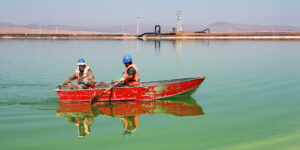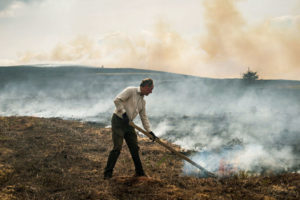If there is a place that embodies our most romantic notions of living in harmony with nature, it is surely a small farming community in the rugged north of Portugal, Covas do Barroso. This village still maintains a tradition of small-scale, independent agriculture that sustains its scarce resources and unspoiled landscapes. It is, according to the United Nations, a “globally important agricultural heritage system”.
In a story that is all too familiar in the fossil fuel age, this heritage now faces ruin; it is sitting on a wealth of natural resources, needed to fuel the modern world from which it stands so proudly aloof. Except this is not a story about fossil fuels at all. The mining company that Covas do Barroso is struggling to keep at bay is there to extract lithium, the key element in electric vehicle batteries.
This is not a battle the villagers are likely to win. The EU wants to end the sale of new petrol and diesel cars by 2035, and the emerging green economy will require lithium batteries for a host of other purposes. To make matters worse, global lithium production is expected to fall short of demand by 2030, and China controls almost two-thirds of the supply.
Yet all of this requires us to ignore the obvious fact that we are not in control of the material basis of our world. Before there is agency, there must be shelves that are stocked, medicine that is available, and technology that works. Perversely, the same global division of labour that has given us these goods and services in such profusion has also encouraged us to take them for granted, by moving their production to other parts of the world. This is what Conway calls the “quid pro quo of modern capitalism”, namely: “you can get anything you want from anywhere in the world for a bargain price, but don’t whatever you do expect to understand how it was made or how it got to you.”
Today we are increasingly finding that, like those farmers in the Barroso region of Portugal, our autonomy is not as secure as we thought. Eruptions of plague and war have exposed the fragility of the material world. In 2021 we learned that we cannot make cars without semiconductors made in Taiwanese factories, and the following year, that we cannot make semiconductors without neon, a gas produced by the now-devastated Azovstal steel plant in Ukraine. We learned that Britain needs affordable natural gas to supply itself with ammonia, and it needs ammonia, among other things, to produce carbon dioxide for preserving food and stunning livestock before slaughter.
More profoundly though, our detachment has been shattered by an awareness that our material systems are degrading the planet and contaminating our bodies. It is now difficult to escape information about vanishing polar ice, polluted groundwater, and microplastics circulating in our blood. Having been raised in the belief that anything is possible with enough willpower and imagination, we find ourselves implicated in a disaster of impersonal proportions.
The question that will define the coming decades is how our societies will respond to this staggering loss of agency. What we have seen so far are in large part coping mechanisms. An obsessive focus on carbon emissions, though it has caused a great deal of anxiety, has also helped to make our impact on the natural world seem like something that can be addressed through better consumer choices and activism.
No doubt environmentalism as a moral crusade can help at the margin; our use of resources remains heinously wasteful. But it can also be counter-productive. If people believe they can make a difference by resisting any industry that harms the planet, how will we actually get the materials we need for a new energy infrastructure? Renewables are generally much less energy dense than fossil fuels, and so must be built in huge numbers. A single natural gas processing facility, Ras Laffan in Qatar, produces more energy than all the world’s solar panels and wind turbines combined.
As Material World makes clear, we have become so dependent on harvesting the earth’s resources at enormous scale, the most important changes now will be industrial and technological. In particular, they will come from more efficient ways of extracting, processing, and recycling materials. It may seem absurd to rely on mining companies and oil refineries to save our disintegrating world, especially when so many of the hoped-for technical breakthroughs are still pipe dreams. But the tragedy of our situation is that there is no longer any route back to a more modest existence of the kind embodied by Covas do Barroso.
If we don’t produce concrete and steel, we can’t build hospitals and schools. If we don’t keep converting petrochemicals into nitrates for fertiliser, people will starve. If we don’t mine copper, we cannot have electricity. That’s just how things go in the material world.
Disclaimer
Some of the posts we share are controversial and we do not necessarily agree with them in the whole extend. Sometimes we agree with the content or part of it but we do not agree with the narration or language. Nevertheless we find them somehow interesting, valuable and/or informative or we share them, because we strongly believe in freedom of speech, free press and journalism. We strongly encourage you to have a critical approach to all the content, do your own research and analysis to build your own opinion.
We would be glad to have your feedback.
Source: UnHerd Read the original article here: https://unherd.com/



